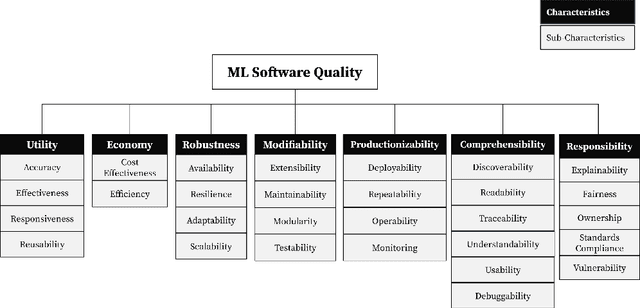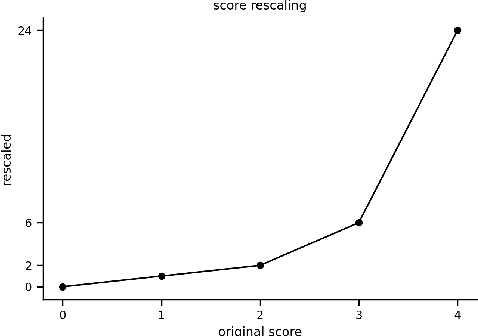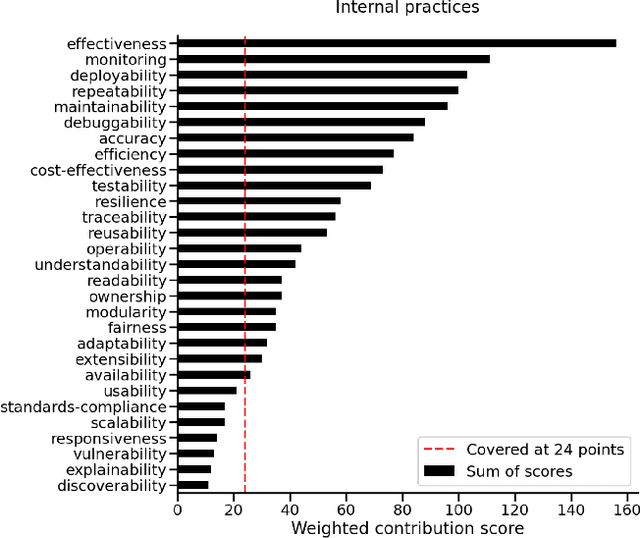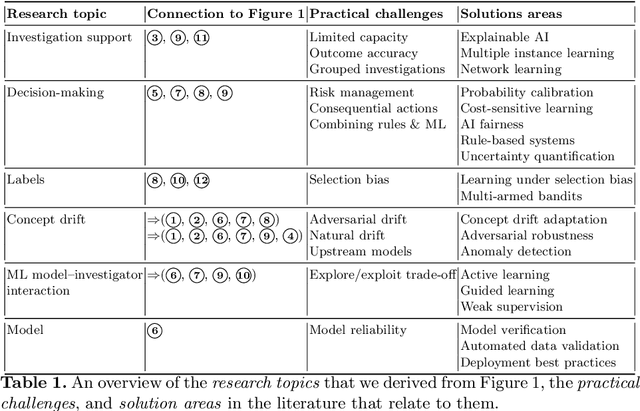Lucas Bernardi
Best Practices for Machine Learning Systems: An Industrial Framework for Analysis and Optimization
Jun 09, 2023



Abstract:In the last few years, the Machine Learning (ML) and Artificial Intelligence community has developed an increasing interest in Software Engineering (SE) for ML Systems leading to a proliferation of best practices, rules, and guidelines aiming at improving the quality of the software of ML Systems. However, understanding their impact on the overall quality has received less attention. Practices are usually presented in a prescriptive manner, without an explicit connection to their overall contribution to software quality. Based on the observation that different practices influence different aspects of software-quality and that one single quality aspect might be addressed by several practices we propose a framework to analyse sets of best practices with focus on quality impact and prioritization of their implementation. We first introduce a hierarchical Software Quality Model (SQM) specifically tailored for ML Systems. Relying on expert knowledge, the connection between individual practices and software quality aspects is explicitly elicited for a large set of well-established practices. Applying set-function optimization techniques we can answer questions such as what is the set of practices that maximizes SQM coverage, what are the most important ones, which practices should be implemented in order to improve specific quality aspects, among others. We illustrate the usage of our framework by analyzing well-known sets of practices.
Simulations in Recommender Systems: An industry perspective
Sep 14, 2021

Abstract:The construction of effective Recommender Systems (RS) is a complex process, mainly due to the nature of RSs which involves large scale software-systems and human interactions. Iterative development processes require deep understanding of a current baseline as well as the ability to estimate the impact of changes in multiple variables of interest. Simulations are well suited to address both challenges and potentially leading to a high velocity construction process, a fundamental requirement in commercial contexts. Recently, there has been significant interest in RS Simulation Platforms, which allow RS developers to easily craft simulated environments where their systems can be analysed. In this work we discuss how simulations help to increase velocity, we look at the literature around RS Simulation Platforms, analyse strengths and gaps and distill a set of guiding principles for the design of RS Simulation Platforms that we believe will maximize the velocity of iterative RS construction processes.
Machine Learning for Fraud Detection in E-Commerce: A Research Agenda
Jul 05, 2021
Abstract:Fraud detection and prevention play an important part in ensuring the sustained operation of any e-commerce business. Machine learning (ML) often plays an important role in these anti-fraud operations, but the organizational context in which these ML models operate cannot be ignored. In this paper, we take an organization-centric view on the topic of fraud detection by formulating an operational model of the anti-fraud departments in e-commerce organizations. We derive 6 research topics and 12 practical challenges for fraud detection from this operational model. We summarize the state of the literature for each research topic, discuss potential solutions to the practical challenges, and identify 22 open research challenges.
Mining the Stars: Learning Quality Ratings with User-facing Explanations for Vacation Rentals
Jan 27, 2021



Abstract:Online Travel Platforms are virtual two-sided marketplaces where guests search for accommodations and accommodation providers list their properties such as hotels and vacation rentals. The large majority of hotels are rated by official institutions with a number of stars indicating the quality of service they provide. It is a simple and effective mechanism that contributes to match supply with demand by helping guests to find options meeting their criteria and accommodation suppliers to market their product to the right segment directly impacting the number of transactions on the platform. Unfortunately, no similar rating system exists for the large majority of vacation rentals, making it difficult for guests to search and compare options and hard for vacation rentals suppliers to market their product effectively. In this work we describe a machine learned quality rating system for vacation rentals. The problem is challenging, mainly due to explainability requirements and the lack of ground truth. We present techniques to address these challenges and empirical evidence of their efficacy. Our system was successfully deployed and validated through Online Controlled Experiments performed in Booking. com, a large Online Travel Platform, and running for more than one year, impacting more than a million accommodations and millions of guests.
Free Lunch! Retrospective Uplift Modeling for Dynamic Promotions Recommendation within ROI Constraints
Aug 17, 2020


Abstract:Promotions and discounts have become key components of modern e-commerce platforms. For online travel platforms (OTPs), popular promotions include room upgrades, free meals and transportation services. By offering these promotions, customers can get more value for their money, while both the OTP and its travel partners may grow their loyal customer base. However, the promotions usually incur a cost that, if uncontrolled, can become unsustainable. Consequently, for a promotion to be viable, its associated costs must be balanced by incremental revenue within set financial constraints. Personalized treatment assignment can be used to satisfy such constraints. This paper introduces a novel uplift modeling technique, relying on the Knapsack Problem formulation, that dynamically optimizes the incremental treatment outcome subject to the required Return on Investment (ROI) constraints. The technique leverages Retrospective Estimation, a modeling approach that relies solely on data from positive outcome examples. The method also addresses training data bias, long term effects, and seasonality challenges via online-dynamic calibration. This approach was tested via offline experiments and online randomized controlled trials at Booking .com - a leading OTP with millions of customers worldwide, resulting in a significant increase in the target outcome while staying within the required financial constraints and outperforming other approaches.
 Add to Chrome
Add to Chrome Add to Firefox
Add to Firefox Add to Edge
Add to Edge